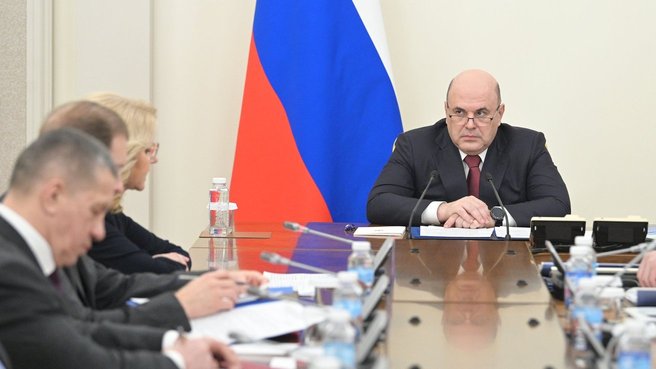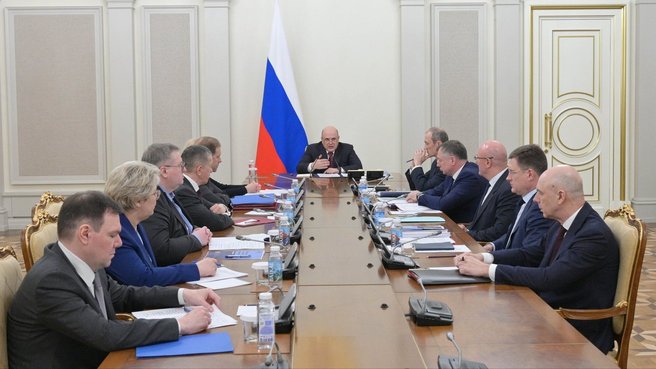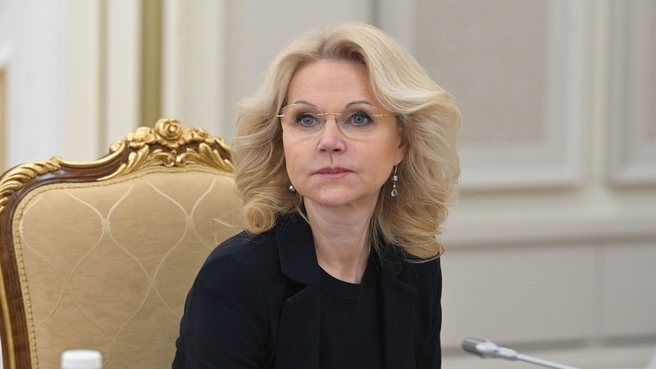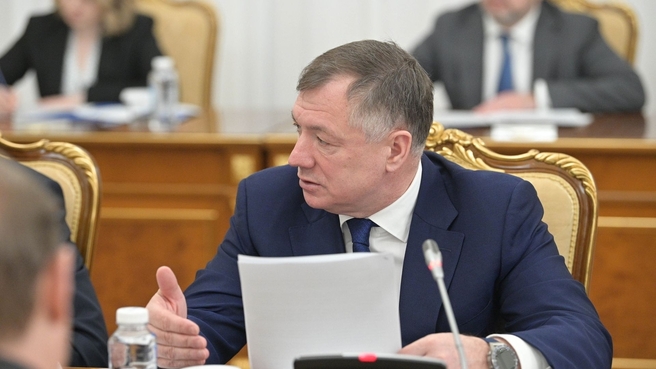Agenda: the plan of measures on countering hepatitis C, the development of a bone marrow donation programme, and the start of nationwide voting for facility improvements.
Mikhail Mishustin’s opening remarks
Marat Khusnullin’s report on nationwide voting for facility improvements
Excerpts from the transcript:
Mikhail Mishustin: Colleagues.
First, I would like to talk about the election. President Vladimir Putin confidently won the election. The overwhelming majority of our citizens supported his candidacy. People trust in our President because he is doing everything he can to improve living standards, develop our country and improve the social sector. The results are obvious. This includes new roads, schools and hospitals, as well as opportunities for good education and self-fulfillment. Everyone sees how our regions are changing and how their infrastructure is gradually being upgraded.
This election outcome was a natural and obvious result of the systematic work in which the Government was most active as a presidential team.
Colleagues.
His victory is not an excuse for us to slow down. On the contrary, it makes us even more responsible for fulfilling presidential instructions. We must reach the goals set by Vladimir Putin as precisely and effectively as we can. Each of you has your own area of responsibility, and of course, you should prioritise the initiatives the President laid out in his Address to the Federal Assembly.
These include, in part, the Family national project and the project on increasing the healthy, active life span of the senior generation; initiating a comprehensive programme on protecting maternity and the health of children and teenagers; the construction of new sports facilities, and the repair and building of kindergartens and schools.
Of course, we will implement other presidential proposals, including preparations to launch the Youth of Russia, Human Resources and Data Economy national projects. We will create and streamline a new remuneration model for public sector employees. We will adopt resolutions to strengthen Russia’s technological sovereignty. We will protect the environment and modernise the transport infrastructure. We will implement the many measures and initiatives listed by the President.
We will have to integrate all these steps with current national projects and state programmes. I would like to point out that it is necessary to fulfil all the President’s instructions in full and on time.
Now, I would like to focus on another issue.
The President has set a goal to create a step-by-step procedure to combat hepatitis C and to minimise the risk of the disease spreading.
The Government will provide the regions with 4.5 billion roubles to purchase the mediations needed to fight this serious disease. We will allocate the same amounts in the next two years. Given the regional investment volumes, we will spend about 18 billion roubles for these purposes over the next three years. This will make it possible to treat about 76,000 people.
Earlier, we set aside annual funding worth over a billion roubles for the centralised purchases of medications to treat combined HIV/hepatitis cases.
We also funded expanded bone marrow transplants, allocating 400 million roubles for this.
Ms Golikova, please tell us how this is going.
Tatyana Golikova: Esteemed Mr Mishustin, esteemed colleagues,
We are carrying out measures on countering hepatitis C under the plan you endorsed in November 2022.
Since 2023, the provisions on organising medical assistance to such patients have been included in state guarantees of free medical care for the public. We adopted separate rates for medical care with compensation for both 24-hour and outpatient centres. This allowed us to provide treatment for 39,000 patients last year. And last year, the Ministry of Health approved the criteria for hospitalising patients with hepatitis C as well as the standards for medical assistance.
Mr Mishustin, last December you endorsed the regulations for a federal registry of patients with hepatitis C, which will become active on September 1, 2024.
We divided patients into the two categories that you mentioned earlier. The first category includes HIV patients with hepatitis – the funding for their treatment comes from the federal budget. The second category includes patients with hepatitis C that do not have other infectious diseases. Their treatment is paid for under compulsory medical insurance and by the regional budgets.
As you said earlier, we will allocate an additional 1.1 billion roubles for HIV patients. This will be enough to treat over 10,000 people, double 2023.
As you said, we will provide the regions with an additional 4.5 billion roubles every year, which will make it possible to treat about 25,000 patients with hepatitis C per year. Overall, 100,000 patients will receive treatment from all sources of funding.
I would like to emphasise that the Ministry of Health will conduct this registry of patients to monitor medical assistance and approach the goal set by the President –to reduce the rate of hepatitis C to a minimum by 2030.
The second no less important decision you mentioned concerns blood cancer patients who need transplantation of bone marrow and hematopoietic stem cells. On presidential instructions, the Federal Medical-Biological Agency has maintained a federal registry of both patients and donors since 2023. The registry already includes information on more than 320,000 donors of bone marrow and hematopoietic stem cells, allowing doctors to promptly select the donors needed for the treatment of leukemia patients. However, we must increase the number of potential donors. As of today, over 100,000 people wishing to become donors have submitted applications to the Federal Medical-Biological Agency.
The resolution you mentioned will make it possible to conduct donor typing and include donors in the registry for a quicker transplantation.
In conclusion, I would like to thank all the caring people who submitted applications. Their generosity will help patients sooner.
Mikhail Mishustin: Thank you, Ms Golikova. You always do this, but I would still like to emphasise that you should keep pharmaceutical supply issues under your personal control, because it is all about providing timely and effective medical help.
Creating a comfortable urban environment is another area of focus.
The President emphasised the importance of taking residents’ opinions into account to create comfortable living conditions in small and large communities.
We pay close attention to this. Nationwide voting for sites that need improvement has been held for the fourth straight year now. A special e-platform was launched for this, which the residents use to decide what streets, green spaces, towns and rural communities should look like, and determine which parks and courtyards should be brought up to standard first.
Almost 35 million participants have come up with suggestions, and about 4,500 public spaces have been brought up to code.
I travel to different regions of the country and can see it for myself.
Another vote is underway. Until April 30, residents from 1,500 municipalities will choose their favourite projects, including new playgrounds and athletic grounds, skating rinks, embankments, and pedestrian areas.
Mr Khusnullin, update us on how this mechanism works and tell us more about the areas that have been improved using it.
Marat Khusnullin: Mr Mishustin,
The President of Russia has set national goals to be achieved no later than 2030, including the improvement of the quality of urban environment by 50 percent. This is a big number. In addition, it is important to involve up to 30 percent of the country's population in the decisions concerning the urban environment.
To achieve these goals, the nationwide online voting for the sites that need improvement is currently underway as part of the Comfortable Urban Environment federal project that is part of the Housing and Urban Environment national project.
This voting was first held in 2021 and has proven to be an effective tool that the public is using to directly influence the choice of improvement projects in urban and rural communities.
I will give you a few examples.
In 2021, Ivan Shchipakin Boulevard in Stavropol was first in a vote held on the single digital platform za.gorodsreda.ru. In 2022, the landscaping of the boulevard was completed, and it has become a point of attraction for residents and guests of the city replete with comfortable recreation areas, athletic grounds and playgrounds. In 2022, Studenchesky Park won the vote in Belgorod and was renovated. People can now enjoy new recreation and athletic facilities. In Yekaterinburg, the Solnechnye Alleys public space in the Solnechny housing development won the vote and was improved. Examples abound, we’ve got thousands of projects like this.
This is just a small portion of the sites; there are many more public spaces. Importantly, the sites that appear in the cities as a result of the voting are important for the residents of specific municipalities.
Notably, this movement is gaining momentum and more sponsors, including businesses and individuals, are getting on board. For example, when we engaged in a landscaping project in Mariupol, one of the courtyards was improved completely by the residents of the city, the people who live in specific series of apartment buildings there.
The voting process is simple and straightforward. You can vote on the za.gorodsreda.ru website through the “Gosuslugi. Reshayem Vmeste” (Government Services. Taking Care of Things Together) feedback platform, or the volunteers’ application which will provide a vote for public places in the participating municipalities.
Volunteers will help everyone make a choice and vote for improvement projects. There are over 146,000 registered volunteers. Recruitment for volunteer coordinating centers started on January 14 and will run through the voting period.
This year, 5,400 public spaces have been nominated for discussion. In the first three days starting March 15, 4.7 million people took part in the voting. This is a fantastic response. We have never voted at such a rate before.
I would like to note that the number of people who care about voting for these projects is growing every year. In 2023, almost one and a half times as many people voted as compared to two years before that. This is 14.2 million people as compared to about 10 million in 2022. In addition, people in the Donetsk and Lugansk people’s republics and the Zaporozhye Region took part in the voting for the first time last year. This year, the Kherson Region joined us.
In general, the Comfortable Urban Environment federal project has shown impressive results. Parks, alleys, green spaces, waterfronts, pedestrian streets and other spaces in large and small communities are being improved to make them comfortable places for living. Appealing recreation spots are being built in the regions that attract local residents. In turn, this fosters the development of small and medium-sized businesses, domestic tourism and the creation of new jobs, which has a positive impact on the socioeconomic development of these localities.
Mr Mishustin, you have attended competitions and exhibitions, and you pay attention to them every time you travel. People show great interest in it, and a whole landscaping industry has been created that includes architects and designers. That is, an entire landscaping industry has come to life thanks to the systematic decisions adopted at the Government level.
In all, 65,200 areas, about 27,700 public spaces and over 37,500 courtyards have been improved under the Comfortable Urban Environment project since 2019.
The President also noted the positive effects of implementing these improvement projects. He decided to extend the Comfortable Urban Environment federal project through 2030. The project has been properly funded, with landscaping and competitions funded separately. This means that the programme to create landscaped public spaces in Russia will continue into the future.
Mikhail Mishustin: Mr Khusnullin, what city will host the next review procedure?
Marat Khusnullin: We haven’t chosen one yet.
Mikhail Mishustin: When do you think you will?
Marat Khusnullin: I believe we will review the results in the early summer.
Mikhail Mishustin: We need to think about which one to choose. We held the most recent one in the Far East, Vladivostok, correct?
Marat Khusnullin: Yes. We will offer two or three to choose from, because there is really a lot of interest…
Mikhail Mishustin: Please do. I am aware that many governors would very much like to host this competition, and there are a number of cities that are ready to host it. We need to make sure that the city of choice lets all the representatives of the regions work effectively.
We should maximise the number of voters and provide comfortable living conditions taking into account the preferences and needs of the people, to make our urban and rural communities modern, comfortable and beautiful places to live. All of that is happening today. We can see the results.
















